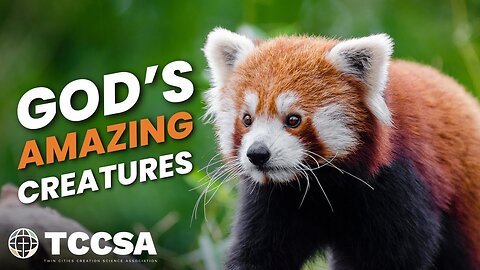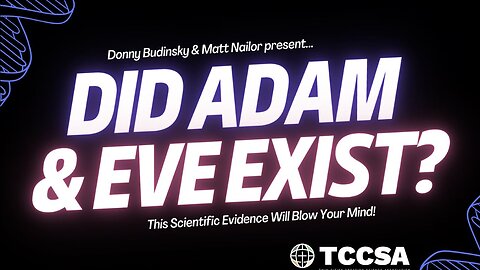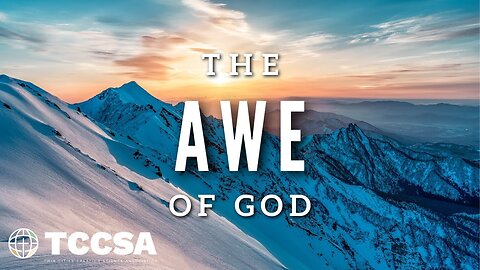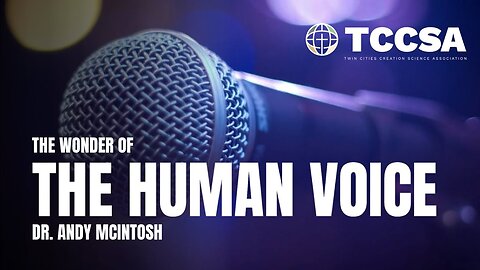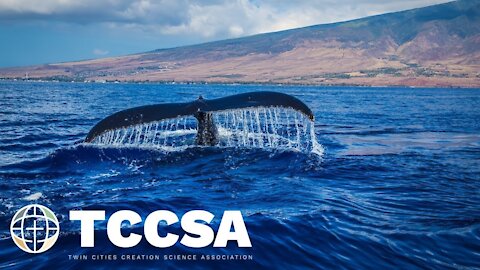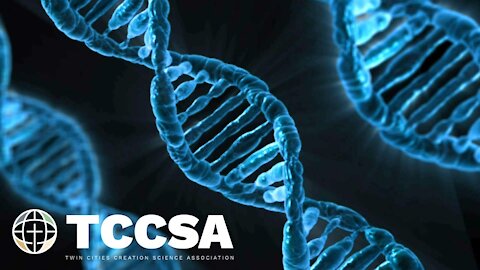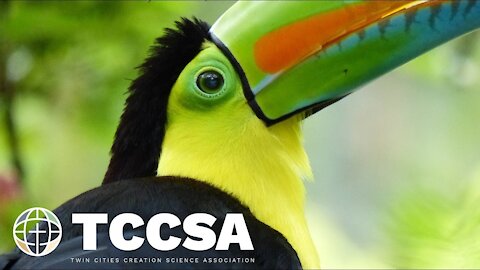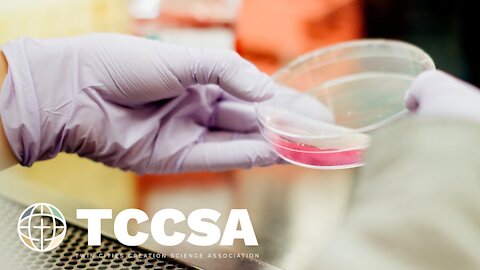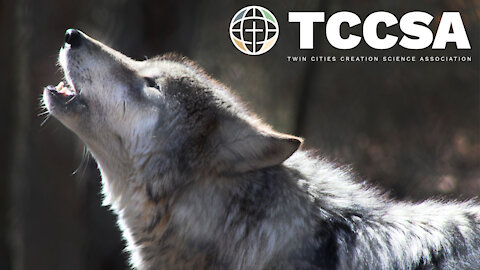
Biology (Life)
25 videos
Updated 5 months ago
-
What Are the Created Kinds? - Jim Orme
 TCCSA: Twin Cities Creation Science AssociationA familiar question is "How did Noah get all the species of animals in the Ark?" But, Noah did not put a pair of every species in the Ark but a pair of each "Kind" of animal. This talk will define a Kind, describe natural selection in terms of Kinds, provide examples of different Kinds and describe how animals are placed into Kinds by people known as baraminologists.7 views
TCCSA: Twin Cities Creation Science AssociationA familiar question is "How did Noah get all the species of animals in the Ark?" But, Noah did not put a pair of every species in the Ark but a pair of each "Kind" of animal. This talk will define a Kind, describe natural selection in terms of Kinds, provide examples of different Kinds and describe how animals are placed into Kinds by people known as baraminologists.7 views -
God's Amazing Creatures - Dr. Joseph Kezele
 TCCSA: Twin Cities Creation Science AssociationDr. Joseph Kezele shows the amazing designs of trilobite eyes, water spiders, platypus, water bears, and more. The Q and A was very insightful.36 views 1 comment
TCCSA: Twin Cities Creation Science AssociationDr. Joseph Kezele shows the amazing designs of trilobite eyes, water spiders, platypus, water bears, and more. The Q and A was very insightful.36 views 1 comment -
Did Adam and Eve Exist? - Donny Budinsky and Matt Nailor
 TCCSA: Twin Cities Creation Science AssociationSee the most up-to-date scientific evidence that confirms the existence of Adam and Eve.97 views 1 comment
TCCSA: Twin Cities Creation Science AssociationSee the most up-to-date scientific evidence that confirms the existence of Adam and Eve.97 views 1 comment -
The Awe of God - Bruce Malone
 TCCSA: Twin Cities Creation Science AssociationLearn from Job and see the awe of God. See seven animals that could not have evolved.112 views
TCCSA: Twin Cities Creation Science AssociationLearn from Job and see the awe of God. See seven animals that could not have evolved.112 views -
The Wonder of the Human Voice - Dr. Andy McIntosh
 TCCSA: Twin Cities Creation Science AssociationDr. Andy McIntosh shows the incredible complexity of human voice.92 views
TCCSA: Twin Cities Creation Science AssociationDr. Andy McIntosh shows the incredible complexity of human voice.92 views -
Whale Evolution - Erik Christenson
 TCCSA: Twin Cities Creation Science AssociationThe Whale Evolution talk will focus on the proposed timeline of whale evolution, the changes that have been made over the last few decades, and what the bones really show. Special whale adaptations will be used to show the complexity of these special water dwelling mammals and the improbability that they evolved from land mammals, but were instead created on the 5th day of creation.34 views 1 comment
TCCSA: Twin Cities Creation Science AssociationThe Whale Evolution talk will focus on the proposed timeline of whale evolution, the changes that have been made over the last few decades, and what the bones really show. Special whale adaptations will be used to show the complexity of these special water dwelling mammals and the improbability that they evolved from land mammals, but were instead created on the 5th day of creation.34 views 1 comment -
Genetic Entropy - Alan K. Walker
 TCCSA: Twin Cities Creation Science AssociationEvolution predicts that over time, because of mutations and natural selection, the best of the mutations will be preserved and the species improved in its overall fitness. Real life experience and experimental evidence, however, reveal a disturbing downhill trend. Mildly harmful mutations are not negatively selected and accumulate, producing an overall decreased fitness. This is true even though severely harmful mutations are eliminated by decreasing the organism's ability to live and reproduce. And even if there were occasional favorable mutations (which is highly debatable) each species is heading inextricably towards extinction.45 views
TCCSA: Twin Cities Creation Science AssociationEvolution predicts that over time, because of mutations and natural selection, the best of the mutations will be preserved and the species improved in its overall fitness. Real life experience and experimental evidence, however, reveal a disturbing downhill trend. Mildly harmful mutations are not negatively selected and accumulate, producing an overall decreased fitness. This is true even though severely harmful mutations are eliminated by decreasing the organism's ability to live and reproduce. And even if there were occasional favorable mutations (which is highly debatable) each species is heading inextricably towards extinction.45 views -
You've Come A Long Way, Baby - Dr. Joseph Kezele
 TCCSA: Twin Cities Creation Science AssociationYou've Come a Long Way, Baby! - The Transition from Prenatal to Postnatal Circulation. This fascinating presentation discusses the physical changes that must occur in the circulatory system for a baby to make the transition from life in the womb to the outside world. Many of the contributing factors that stimulate these changes are also given, demonstrating the irreducible complexity of the mammalian system of giving birth. A medical case history is presented with a surprise ending, and the relevance of all of this to Genesis is demonstrated.34 views 1 comment
TCCSA: Twin Cities Creation Science AssociationYou've Come a Long Way, Baby! - The Transition from Prenatal to Postnatal Circulation. This fascinating presentation discusses the physical changes that must occur in the circulatory system for a baby to make the transition from life in the womb to the outside world. Many of the contributing factors that stimulate these changes are also given, demonstrating the irreducible complexity of the mammalian system of giving birth. A medical case history is presented with a surprise ending, and the relevance of all of this to Genesis is demonstrated.34 views 1 comment -
Creation and Design Features in Costa Rica - Dave Nutting
 TCCSA: Twin Cities Creation Science AssociationFor several years, Dave and Mary Jo Nutting have experienced amazing design features found in the plants, insects, and animals of Costa Rica. In this extremely colorful presentation, they will share the best of these fabulous features. Marvel at not only the breath-taking photos, but also how the extremely diverse ecosystems of Costa Rica reflect the Biblical framework of the Creation, the Fall, Flood, and Dispersion.145 views 1 comment
TCCSA: Twin Cities Creation Science AssociationFor several years, Dave and Mary Jo Nutting have experienced amazing design features found in the plants, insects, and animals of Costa Rica. In this extremely colorful presentation, they will share the best of these fabulous features. Marvel at not only the breath-taking photos, but also how the extremely diverse ecosystems of Costa Rica reflect the Biblical framework of the Creation, the Fall, Flood, and Dispersion.145 views 1 comment -
The First Synthetic Life - Dr. Rob Stadler
 TCCSA: Twin Cities Creation Science AssociationIn 2010, Craig Venter claimed to have created "the first self-replicating species that we've had on the planet whose parent is a computer." This announcement sent ripples through the scientific and faith communities. If life could be created in a laboratory, then natural processes could have started the first life on the planet. This talk will explore Venter's results and the lessons they provide - insights into the requirements to produce life from purely natural processes.133 views 2 comments
TCCSA: Twin Cities Creation Science AssociationIn 2010, Craig Venter claimed to have created "the first self-replicating species that we've had on the planet whose parent is a computer." This announcement sent ripples through the scientific and faith communities. If life could be created in a laboratory, then natural processes could have started the first life on the planet. This talk will explore Venter's results and the lessons they provide - insights into the requirements to produce life from purely natural processes.133 views 2 comments
